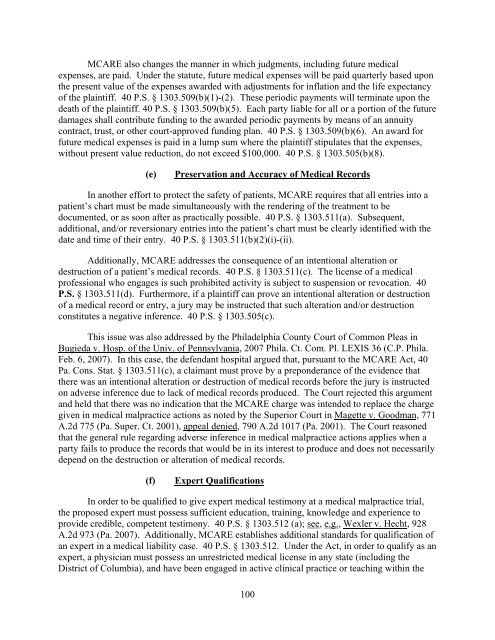2012 PROFESSIONAL LIABILITY UPDATE - Eckert Seamans
2012 PROFESSIONAL LIABILITY UPDATE - Eckert Seamans
2012 PROFESSIONAL LIABILITY UPDATE - Eckert Seamans
Create successful ePaper yourself
Turn your PDF publications into a flip-book with our unique Google optimized e-Paper software.
MCARE also changes the manner in which judgments, including future medicalexpenses, are paid. Under the statute, future medical expenses will be paid quarterly based uponthe present value of the expenses awarded with adjustments for inflation and the life expectancyof the plaintiff. 40 P.S. § 1303.509(b)(1)-(2). These periodic payments will terminate upon thedeath of the plaintiff. 40 P.S. § 1303.509(b)(5). Each party liable for all or a portion of the futuredamages shall contribute funding to the awarded periodic payments by means of an annuitycontract, trust, or other court-approved funding plan. 40 P.S. § 1303.509(b)(6). An award forfuture medical expenses is paid in a lump sum where the plaintiff stipulates that the expenses,without present value reduction, do not exceed $100,000. 40 P.S. § 1303.505(b)(8).(e)Preservation and Accuracy of Medical RecordsIn another effort to protect the safety of patients, MCARE requires that all entries into apatient’s chart must be made simultaneously with the rendering of the treatment to bedocumented, or as soon after as practically possible. 40 P.S. § 1303.511(a). Subsequent,additional, and/or reversionary entries into the patient’s chart must be clearly identified with thedate and time of their entry. 40 P.S. § 1303.511(b)(2)(i)-(ii).Additionally, MCARE addresses the consequence of an intentional alteration ordestruction of a patient’s medical records. 40 P.S. § 1303.511(c). The license of a medicalprofessional who engages is such prohibited activity is subject to suspension or revocation. 40P.S. § 1303.511(d). Furthermore, if a plaintiff can prove an intentional alteration or destructionof a medical record or entry, a jury may be instructed that such alteration and/or destructionconstitutes a negative inference. 40 P.S. § 1303.505(c).This issue was also addressed by the Philadelphia County Court of Common Pleas inBugieda v. Hosp. of the Univ. of Pennsylvania, 2007 Phila. Ct. Com. Pl. LEXIS 36 (C.P. Phila.Feb. 6, 2007). In this case, the defendant hospital argued that, pursuant to the MCARE Act, 40Pa. Cons. Stat. § 1303.511(c), a claimant must prove by a preponderance of the evidence thatthere was an intentional alteration or destruction of medical records before the jury is instructedon adverse inference due to lack of medical records produced. The Court rejected this argumentand held that there was no indication that the MCARE charge was intended to replace the chargegiven in medical malpractice actions as noted by the Superior Court in Magette v. Goodman, 771A.2d 775 (Pa. Super. Ct. 2001), appeal denied, 790 A.2d 1017 (Pa. 2001). The Court reasonedthat the general rule regarding adverse inference in medical malpractice actions applies when aparty fails to produce the records that would be in its interest to produce and does not necessarilydepend on the destruction or alteration of medical records.(f)Expert QualificationsIn order to be qualified to give expert medical testimony at a medical malpractice trial,the proposed expert must possess sufficient education, training, knowledge and experience toprovide credible, competent testimony. 40 P.S. § 1303.512 (a); see, e.g., Wexler v. Hecht, 928A.2d 973 (Pa. 2007). Additionally, MCARE establishes additional standards for qualification ofan expert in a medical liability case. 40 P.S. § 1303.512. Under the Act, in order to qualify as anexpert, a physician must possess an unrestricted medical license in any state (including theDistrict of Columbia), and have been engaged in active clinical practice or teaching within the100









